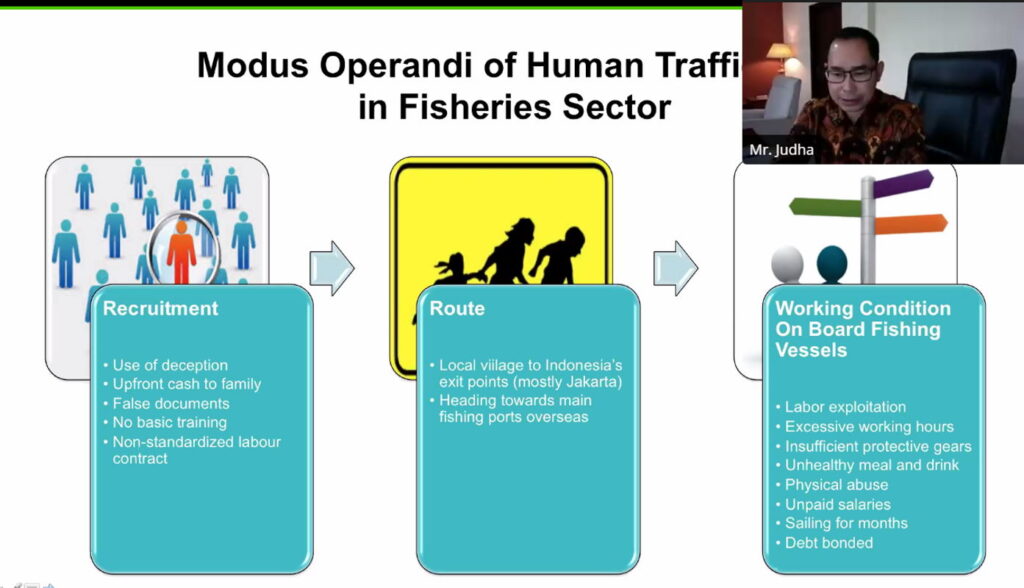
The second webinar in the series of the Blue Justice Forum, facilitated by the UNDP’s Blue Resilience project in conjunction with the Blue Justice Initiative’s Secretariat, was held on 3 September 2020.
The webinar was hosted by the Indonesia Ocean Justice Initiative (IOJI) and attracted considerable attention, focusing on the disturbing and important topic of ‘Human Trafficking the Fisheries Sector: The Indonesian Example’.
The webinar was led by an expert panel comprising: Wawan Fahrudin (Coordinator of Professional Workers of the Head of Indonesian Migrant Workers Protection Agency); Mas Achmad Santosa (CEO of the IOJI); Judha Nugraha (Director for the Protection of Citizen and Legal Entities Overseas at the Ministry of Foreign Affairs, Indonesia) and Gunnar Stølsvik (Policy Director of the Norwegian Ministry of Trade, Industry, and Fisheries).

A total of 164 participants joined the webinar from 12 countries (Austria, Brunei Darussalam, Denmark, France, India, Indonesia, Norway, Philippines, South Africa, Trinidad and Tobago, the United Kingdom and the United States of America). The webinar was moderated by Emma Witbooi (UNDP Blue Resilience project).
Key points highlighted in the webinar included:
- There has been a rise in the number of complaints from Indonesians of human trafficking in fisheries in 2020.
- Human trafficking is committed all over the world due to the high mobility of fishing vessels.
- The chain of events resulting in human trafficking on fishing vessels – from deceit associated with recruitment and placement processes in rural communities via recruitment agencies through to sub-standard working and living conditions on vessels, underscore the transnational nature and complexity of the problem.
- The Indonesian government is proactively addressing human trafficking in fisheries via means aimed at, amongst others: increased institutional cooperation amongst relevant national authorities (e.g. labour, transport and fisheries), awareness-raising and information on the problem to alert potential victims and emphasis on the need for cooperation between flag states and port states in legal enforcement.
- Globally, to address human trafficking in fisheries, at national level, the governance of safe migration, training and skill-building, and standardized labor contracts are to be encouraged.
- At the international level, international cooperation between flag and port states needs to be strengthened through, for example, promoting MoUs with countries of destination, MLA, and regional and multilateral diplomacy.
- There is a need to continue to raise international awareness of the need for enhanced cooperation for global coalition actions to tackle human trafficking in fisheries, such as under the Copenhagen Declaration.
The next webinar will be on 10 September, hosted by Gunnar Stølsvik, Policy Director of the Norwegian Ministry of Trade, Industry, and Fisheries on: ‘The Copenhagen Declaration’. Sign up and join us! https://bluejustice.org/forum-2020/.